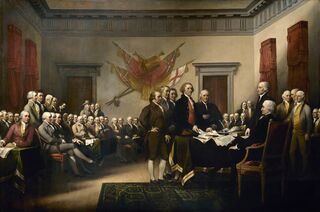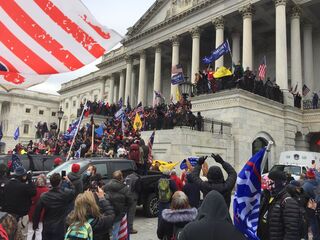Psychology
Behavioral economists see partisan good, threat, in America
Setting Bounds on the Psychology of Partisanship
Posted February 22, 2021 Reviewed by Lybi Ma

As I’ve discussed in past posts, the traditional form of economic theory, which reigned supreme until encountering serious competition from behavioral economics, predicted that a democratic political system cannot exist in a city, state, or country in which the number of citizens is large. The reason is that the pre-behavioral theory assumed that individuals are strictly self-interested and perfectly rational. They would therefore allocate their time between competing uses in a rational and selfish manner.
Although the actions and policies of the city, state, or national government could affect the material well-being of the rational, self-interested citizen, the motivation to get engaged by informing oneself of the issues and then voting would be absent because the number of citizens is too large and democracy gives each of them an equal vote. If more than a handful decided to vote, then the likelihood that any one of their votes would flip an electoral outcome from what it would have been without their vote is in the same ball-park as the chance of lightning, a chunk of space junk, or an asteroid striking the ground they were standing on—not impossible, but the kind of odds economists like to call “vanishingly small.”
Assuming that the rational citizen doesn’t derive direct utility from voting the way she might get pleasure from watching an entertaining movie or hanging out with a friend, or assuming that there’s some monetary cost associated with voting like some loss of overtime pay or forking over the fare for a bus ride to the polling place, then the rational citizen should never vote since these costs are certain to outweigh any benefit. It’s not so much that the material benefit of your preferred policy winning has to be small that makes the benefit in this cost-benefit analysis insufficient, but rather that the relevant “expected benefit” is the product of that material benefit multiplied by the near-zero probability that your vote will flip the outcome. The rational, self-interested citizen would never vote, according to this logic, so a government forced to respond to the demands of citizens is impossible, if their channel of expression of those demands is assumed to be voting.
If there’s to be a government of some kind, then, it has to be some other form of government, this logic implied. It might be government by political bosses who treat it as their personal property, government by a dictator, or government elected by those individuals whose rationality and intelligence is too low to understand the logic laid out in the previous paragraphs, or elected by a mixture of such irrational voters with voters who are such die-hards for their particular political preference that they value its triumph over the alternatives almost infinitely, thereby counterbalancing the vanishingly small likelihood of making a decisive difference.
My collaborators Kenju Kamei, Jean-Robert Tyran, and I argue in our paper on “Civic Engagement as a Second-Order Public Good” that several behavioral forces or aspects of social psychology might help to overturn the prediction of pre-behavioral economic theory and render democracy a possibility after all. Our paper mainly emphasizes pro-social impulses capable of supporting a willingness to forego small private gains to perform one’s part as a citizen, and we demonstrate the presence of such impulses by means of the laboratory decision-making experiment that we report in it. There’s another behavioral impulse that we discuss briefly in the concluding section of the paper which we discount at our peril. That impulse is the tendency to identify with a team and to draw energy from the spirit of competition, which in the political sphere takes the form of partisanship.
Kamei, Tyran, and I admit that our emphasis on the pro-social willingness to be a good citizen, and on the roles of family and schooling in socializing individuals towards civic responsibility, might be overblown because of the small part that we assign to partisanship. We counter that worry by noting that even partisan motives for engagement in political activity are irrational according to pre-behavioral economics. No matter how much you want your side to win, that is, your own individual contribution to the outcome will almost surely have a vanishingly small effect; it’s more rational to sit on the sidelines and let other team members “carry the water.”

The attempted thwarting of a peaceful transfer of power in the United States following the November 2020 presidential election, however, puts this discussion of partisanship in a new and more worrisome light. When Kamei, Tyran, and I were thinking of partisan competition as a factor that might lend some energy to civic engagement, we were assuming that the members of the relevant parties accepted the basic rules of electoral democracy. We failed to imagine what had seemed unimaginable in mature Western democracies prior to our writing: that one of the major political parties would be willing to overturn a democratic electoral outcome to cling to power. When this happened, the partisanship that had helped to energize citizen engagement in U.S. elections of the past metastasized into its opposite, a threat to the very institution of democracy.
Seen through the lens of our research, the lesson of January 6, 2021, is that democracy may be possible, but stronger institutional safeguards than have heretofore been present in the United States will be needed if it’s to be preserved. The U.S. will have to develop a set of rules that prohibit any political party that fails to commit itself to electoral democracy and any candidate who refuses to commit to accepting election results from appearing on the ballot in a local, state, or national election.
Until the U.S. adopts laws to this effect—the kind of laws that would have led to the Republican candidate’s name being removed from the presidential ballots in both 2016 and 2020 because he publicly stated his unwillingness to commit to respecting the outcome of the vote during widely televised debates and interviews in both years—the future of political democracy in the United States will remain seriously in doubt.
References
Kenju Kamei, Louis Putterman and Jean-Robert Tyran, “Civic Engagement as a Second-Order Public Good: The Cooperative Underpinnings of the Accountable State,” Center for Economic Policy Research Discussion Paper 13985, 2019.


